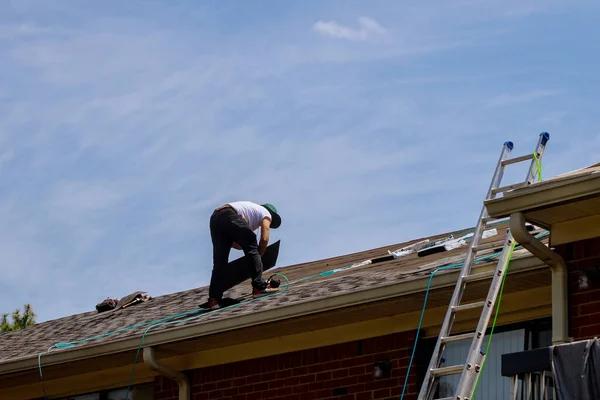
Weather plays a significant role in determining the schedule for your roofing replacement. It is a critical factor that homeowners need to consider when planning any type of exterior home improvement project, including roof replacements. The impact of weather on your roofing replacement schedule can be seen in various ways.
Firstly, temperature and humidity significantly affect the installation process of certain types of roofs. For instance, asphalt shingles, which are commonly used in residential properties, have an optimal installation temperature range between 40 to 85 degrees Fahrenheit. Installing these shingles in too cold or too hot conditions may lead to complications such as cracking or improper sealing.
Secondly, wet weather conditions can also delay your roofing replacement schedule. Rain or snow makes it unsafe for workers to be on the roof due to slippery surfaces and poor visibility. Moreover, moisture trapped under new roofing materials could lead to mold growth and wood rot over time.
Extreme weather conditions like high winds and storms can also influence the timing of your roof replacement project. These conditions could cause further damage during the process by tearing off newly installed materials or causing debris to fall onto the roof.
The ideal time for most roofing projects is typically during late spring through early fall when temperatures are moderate and precipitation levels are lower than other times of year. However, it’s important not just considering seasonal factors but also looking at local climate patterns for more accurate scheduling.
In addition to affecting the actual work timeline, weather can also impact how quickly you need a roof replacement. Severe weather events such as hailstorms or hurricanes can cause significant damage necessitating immediate repair or even full-scale replacement depending on severity level.
It’s always best practice consulting with professional contractors who have experience working within your specific region’s climate patterns before making final decisions about timing and material choices for your roofing project.
Lastly, remember that while you can’t control the weather; you do have control over selecting reliable professionals who will take necessary precautions against potential issues caused by weather conditions. This includes ensuring that your roof is adequately protected during unexpected inclement weather, and scheduling the project at a time when the forecast predicts favorable conditions.
In conclusion, while weather significantly affects your roofing replacement schedule, careful planning and working with experienced professionals can help mitigate these impacts. By considering temperature, humidity levels, precipitation patterns and extreme weather events in your area, you can better plan for a successful roofing replacement project irrespective of Mother Nature’s whims.
Paragon Roofing Co
54 Suncook Valley Rd, Alton, NH 03809
603-581-4334








